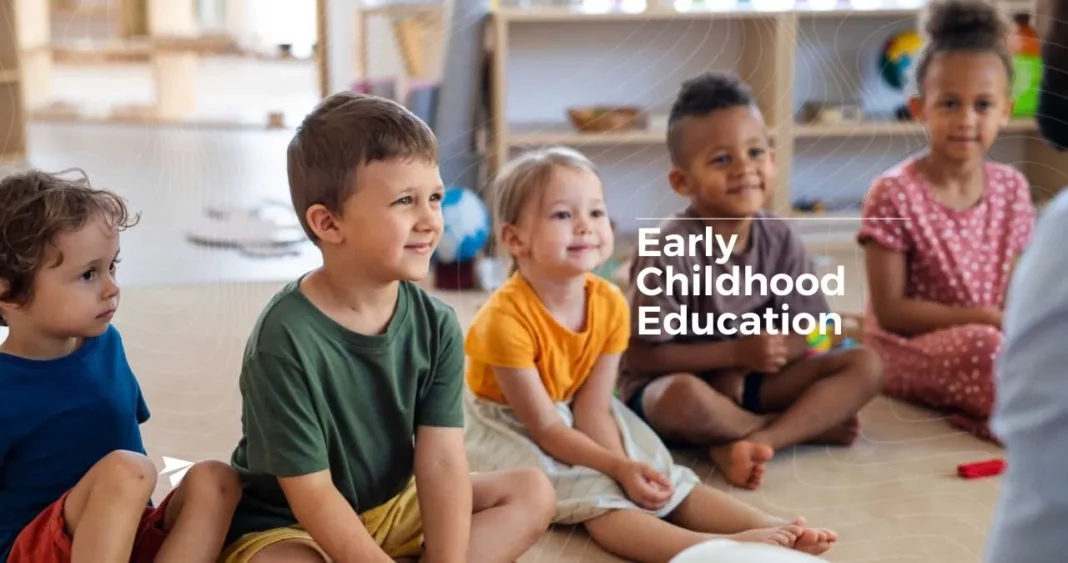Unveiling the Future through Early Education
Early Childhood Education where the seeds of tomorrow are sown. In these formative years, the foundations of a child’s learning journey are laid. Promising a future shaped by the power of education. From educational reforms to the pivotal role of quality programs, join us on a brief exploration into the world of early education. Let’s unravel how these early years become the canvas upon which life chances are painted, tackling childhood disadvantage and sculpting a future where literacy, numeracy, and the joy of reading are the cornerstones. Are you prepared to learn how we might influence future generations’ fates for the better, Now let’s get started..

Early Years Education Reform: A Gateway to Life Chances
In the ever-evolving landscape of education, the call for reform echoes loudly, particularly in the crucial early years. Early Years Education Reform stands as a transformative force, offering a gateway to enhanced life chances for children. As we navigate this realm, we delve into the various facets of educational reform and its profound impact on shaping the future.
Policy Shifts and Structural Changes
Explore the dynamic shifts in educational policies and structural changes aimed at optimizing early education. How are governments and educational institutions reimagining the early learning landscape to provide better opportunities for children.
Equity and Inclusivity
Uncover the initiatives focused on promoting equity and inclusivity within early education. How are reforms addressing socio-economic disparities and ensuring that every child, regardless of background, has equal access to quality education.
Innovative Teaching Approaches
Examine the innovative teaching methodologies introduced through educational reforms. How are educators adapting their approaches to cater to diverse learning styles, fostering a more engaging and effective learning environment.
Integration of Technology
Understand the role of technology in early education reform. How are digital tools being integrated into the learning process, and what benefits does this bring to the educational experiences of young learners?
Professional Development for Educators
Explore the emphasis on continuous professional development for educators. How are reforms addressing the need for well-trained and qualified teachers, recognizing their pivotal role in shaping the educational journey of young minds.
By navigating the landscape of Early Years Education Reform, we gain insights into the potential and challenges of reshaping the educational trajectory for children. This exploration serves as a compass, guiding us through the dynamic changes that hold the promise of enhancing life chances and building a brighter future for the youngest members of our society.
Addressing Childhood Disadvantage through Education and Care
In the pursuit of a fair and equitable society, the spotlight turns to the pivotal role that Early Childhood Education (ECE) plays in addressing childhood disadvantage. This section explores the multifaceted ways in which ECE acts as a catalyst for positive change, countering the impact of social disparities.
Early Intervention and Holistic Development
Investigate how early childhood education acts as a powerful tool for early intervention. How does it contribute to the holistic development of children, providing a foundation that transcends academic learning to encompass social, emotional, and physical well-being.
Socialization and Community Integration
Delve into the socialization aspect of ECE programs. How do these initiatives foster a sense of community, promoting integration and reducing the effects of social disadvantage on young minds.
Access to Quality Care for All
Examine the initiatives aimed at ensuring universal access to quality early childhood care. How are educational institutions and policymakers working to bridge the gap and make high-quality education and care accessible to every child, irrespective of socio-economic backgrounds.
Parental Involvement and Support Networks
Uncover the significance of parental involvement in early education. How do programs encourage active participation from parents and caregivers, establishing support networks that contribute to the overall well-being of the child.
Breakdown of Stereotypes and Bias
Explore how ECE programs challenge stereotypes and biases, creating an inclusive environment that celebrates diversity. How are educators fostering a sense of acceptance and understanding, laying the groundwork for a more inclusive society.
As we navigate the landscape of addressing childhood disadvantage through education and care, it becomes evident that early intervention holds the key to breaking the cycle of social impact. By understanding the various dimensions of this transformative process, we can appreciate the profound influence that quality early childhood education can have on shaping a more just and equitable society.
Transformative Power of High-Quality Early Childhood Programs

High-quality early childhood programs stand as beacons of transformation, shaping the trajectory of young lives in profound ways. This section delves into the elements that make these programs impactful and explores the positive changes they bring to the lives of children.
Holistic Developmental Approach
Examine the holistic nature of high-quality early childhood programs. How do these initiatives go beyond academic learning, fostering the overall development of a child by addressing social, emotional, and physical aspects?
Qualified Educators and Nurturing Environments
Explore the importance of having qualified educators in early childhood programs. How do well-trained teachers create nurturing environments that stimulate curiosity, creativity, and a love for learning in young minds.
Individualized Learning and Differentiated Instruction
Investigate the emphasis on individualized learning experiences. How do high-quality programs tailor instruction to meet the unique needs of each child, fostering a personalized approach that recognizes and nurtures individual strengths.
Inclusive Practices and Diversity
Examine the role of inclusivity and diversity in shaping high-quality programs. How do these initiatives create environments that celebrate differences, promoting understanding and empathy among young learners.
Family Engagement and Community Integration
Delve into the significance of family engagement in early childhood education. How do high-quality programs build bridges between educators, families, and communities. Creating a collaborative ecosystem that enhances the overall learning experience.
Assessment for Growth and Progress
Understand the role of assessment in measuring growth and progress. How do high-quality programs utilize assessments not just for evaluation but as tools for identifying areas of improvement and providing targeted support for each child’s development.
By unraveling the transformative power embedded in high-quality early childhood programs. We gain insights into the profound impact of these initiatives on the lives of young learners. From fostering a love for learning to laying the groundwork for future success, these programs serve as catalysts for positive change, contributing to the holistic development of the next generation.
Building Blocks: Foundations of Literacy and Numeracy

Foundations of literacy and numeracy represent the bedrock upon which a child’s educational journey is built. In this section, we delve into the essential components that form the building blocks of early education. Shaping a child’s ability to navigate the realms of language and mathematics.
Emergent Literacy: The Joy of Reading
Explore the concept of emergent literacy and its role in cultivating a love for reading from an early age. How do educators lay the foundation for literacy skills by immersing children in a world of stories, words, and the magic of language.
Numeracy in Play: Counting, Patterns, and Beyond
Examine the integration of numeracy skills through play-based learning. How do early education programs incorporate counting, recognizing patterns, and other mathematical concepts into interactive and enjoyable activities, fostering a positive attitude toward numeracy.
Language Development: Communication and Expression
Investigate the strategies employed to support language development. How do educators create environments that encourage effective communication, vocabulary expansion, and the development of expressive language skills among young learners.
Interactive Learning Tools and Resources
Delve into the role of interactive tools and resources in building literacy and numeracy foundations. How do educational programs leverage technology, books, games, and other resources to engage children actively in the learning process.
Cultural and Linguistic Diversity
Recognize the importance of embracing cultural and linguistic diversity in early education. How do programs ensure that literacy and numeracy initiatives are inclusive and reflective of the diverse backgrounds and languages of the young learners.
By uncovering the intricacies of literacy and numeracy foundations. We gain a deeper appreciation for the intentional and nurturing approach required in early education. These building blocks not only equip children with essential skills but also lay the groundwork for a lifelong journey of exploration, curiosity, and a profound connection to the world of knowledge.
How We Are Destroying Our Future Generations by Not Reading
In this stimulating segment, we address a crucial topic: the possible repercussions of not encouraging reading in a child’s early years. Examining the repercussions on society and the person. Our goal is to highlight the negative consequences of undervaluing the transformative potential of reading.
Literacy as a Lifeline: Igniting the Imagination
Explore how reading serves as a lifeline for developing imagination and creativity. How does neglecting this fundamental aspect impede a child’s ability to dream, envision possibilities, and think critically.
Communication Breakdown: The Importance of Vocabulary
Investigate the link between reading and vocabulary development. How does a lack of exposure to reading material hinder a child’s ability to communicate effectively, express thoughts, and comprehend complex ideas.
Academic Struggles: Impact on Educational Attainment
Delve into the potential academic struggles that arise when reading is not prioritized. How does a deficiency in reading skills early on affect a child’s performance in school, hindering their overall educational attainment.
Technology Overload: Screen Time vs. Book Time
Examine the prevalence of technology and screen time in comparison to the time spent with books. How does an overreliance on digital devices impact a child’s cognitive development, attention span, and overall engagement with learning.
Missed Opportunities: Bonding Through Storytelling
Reflect on the missed opportunities for bonding between caregivers and children through storytelling. How does the absence of shared reading experiences affect the parent-child relationship and the cultivation of a positive attitude toward learning.
Cultural Decay: Loss of Literary Heritage
Consider the broader cultural implications of neglecting reading. How does a decline in literary engagement contribute to the erosion of cultural heritage. Diminishing the rich tapestry of stories passed down through generations.
By addressing the stark reality of how the lack of emphasis on reading impacts our future generations. We hope to ignite a conversation about the vital role reading plays in shaping not only individual lives but the collective trajectory of society as a whole.
Conclusion
Nurturing Tomorrow’s Bright Minds through Early Education
In concluding our exploration into the world of early childhood education. It becomes evident that the seeds planted during these formative years blossom into the future architects of our society. Early education reforms, quality programs, and the foundational pillars of literacy and numeracy collectively shape the destiny of our youngest learners. However, we cannot overlook the perilous consequences of neglecting the transformative power of reading in these crucial years.
As we reflect on the potential pitfalls of not prioritizing reading, the urgency to redefine our approach becomes clear. Reading is not merely an academic exercise; it’s a gateway to imagination, effective communication, and educational success. Ignoring its significance risks hindering not only individual growth but also the cultural and intellectual fabric of our communities.
In nurturing tomorrow’s bright minds. We must advocate for comprehensive early education, recognizing the interconnectedness of literacy, numeracy, and the joy of reading. By fostering environments that celebrate diversity, encourage family engagement, and integrate technology judiciously. We can ensure that every child, regardless of background, has access to a holistic educational experience.
Our responsibility extends beyond academic achievement. It encompasses the cultivation of well-rounded individuals who can navigate a complex world with curiosity, resilience, and a love for learning. Let this exploration serve as a catalyst for continued conversations and actions that prioritize the holistic development of our future generations through the transformative power of early education and the timeless magic of reading.

